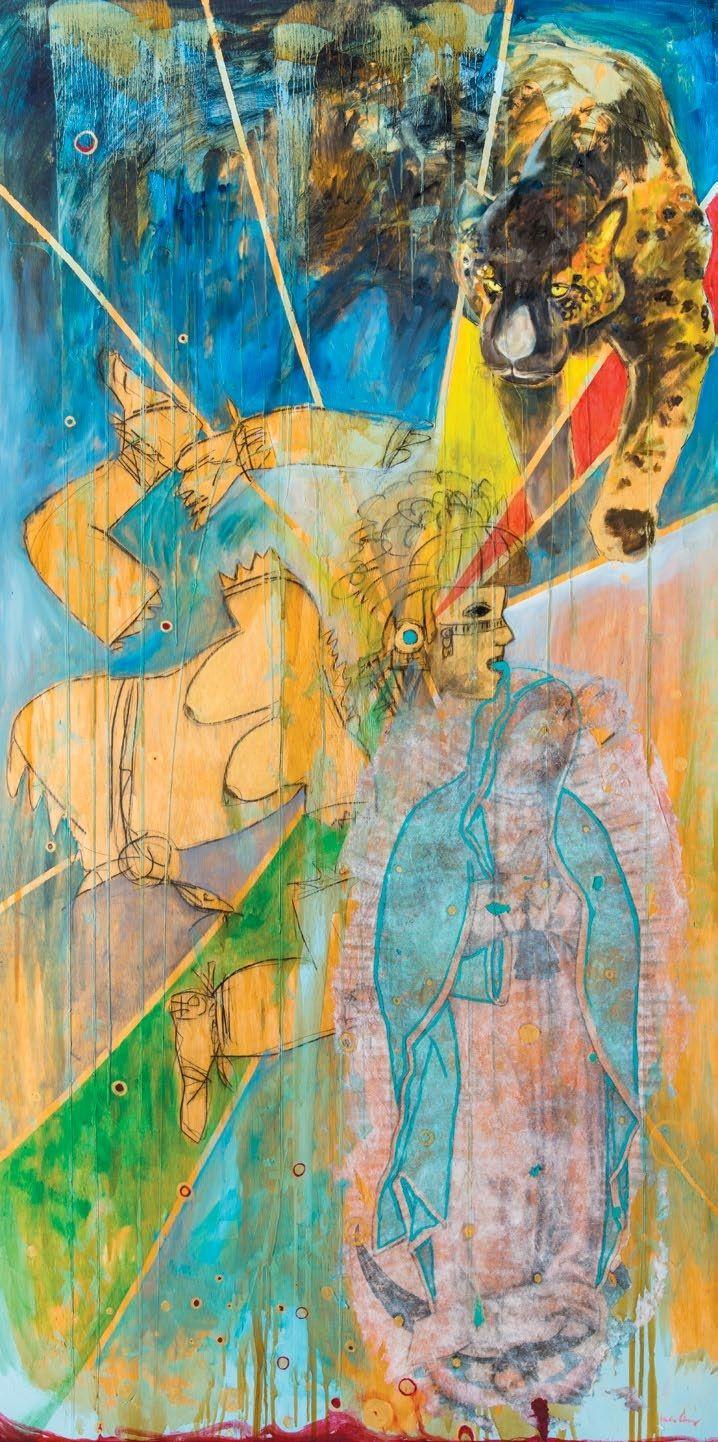
Mixed media on wood, by Indra Arriaga Delgado

Mixed media on wood, by Indra Arriaga Delgado
by Indra Arriaga Delgado
Spring 2022, FORUM Magazine
THERE'S A STORY in my family of when I was about 9 years old, and I was a badly behaved child—extremely badly behaved.
I suppose my rebellion and inconformity had something to do with being uprooted from my home in rural Mexico, where I ran around free, and was then taken to Texas where we lived in a one-bedroom apartment, I had no friends, didn't speak the language, and wasn't allowed out because the city presented dangers I wouldn't know how to handle. My mother had reached a point where she was ready to take me back to Mexico to stay with my grandmother because I was insufferable. On the way home, we accompanied my great-aunt, Tia Melo, to the Basilica de Guadalupe in Mexico City, the heart of our faith.
The story goes (and it is a true story because I remember it) that we went inside the basilica and Tia Melo said a prayer asking the Virgen de Guadalupe to take me into her care. I rolled my eyes and went out to explore, with my mom and my aunt following behind me. There was quite a distance between us because they walked slowly, and I ran off. As I was spiritedly walking, someone slapped me on the back of my head. I was thrust forward in one fell swoop and my scalp burned where I had been hit. I thought my mother had slapped my head and I turned around angrily and yelled, “Why did you hit me?!” but there was no one there. My mother and my great-aunt observed what happened at a distance and stood quietly still. My mother reports that I was a different child after that incident. She calls it a miracle. I refer to it as getting bitch-slapped by the Virgen.
“The Creation” is a story I tell myself about the now almost-inseparable bond between the Virgen de Guadalupe and Tonantzin, about the creation of the world through an Indigenous womb.
My relationship status with la Virgen de Guadalupe is complicated. Like many Mexican children, I was taught and even memorized Juan Diego's trek up, down, and around the Tepeyac, how he navigated the racist clergy and brought forth the miracle of the roses and a newly-minted image of Mary in brown-face. But I was never told about the Spaniards’ colonization practices of building their churches over ceremonial sites to bury the Indigenous religions and keep the people coming back to the sites. Conversion was all about location, location, location. I was never told that the Virgen de Guadalupe was Tonantzin’s doppelganger. Tonantzin is our Indigenous deity whose name means “our holy/sacred mother.” I was never told that the image of the Virgen is believed to be painted by an Indigenous artist. I was never told that many of the ancient dances were forbidden; in fact, I was never told a lot of things.
Painting “The Creation” was an act of thinking through the complex dynamics of recon-ciling the “stories” that form my identity and that of my people. Five hundred years of colonization, or invasion, has resulted in a lop-sided sense of history, especially if you have Indigenous or Black roots because you are told again and again that is better to be White; that you’re of a higher class, more beautiful, and smarter if you can say you have blood ties to Europe. Well, I don’t. And if I do, I don’t know it. “The Creation” is a story I tell myself about the now almost-inseparable bond between the Virgen de Guadalupe and Tonantzin, about the creation of the world through an Indigenous womb. Because if the colonizers can tell me a story to belittle my brownness, then I can tell a story to usurp their creation—a religious icon—and I can honor my mixed heritage without compromising my Indigenous roots and contribute maybe just a little to 500 years of ongoing resistance.
The Indigenous deity in the painting is not Tonantzin, it’s Coyolxauhqui—but that is a different story. ■
Indra Arriaga Delgado is a Mexican artist, research analyst, and community organizer living and working in Anchorage, Alaska.
The Alaska Humanities Forum is a non-profit, non-partisan organization that designs and facilitates experiences to bridge distance and difference – programming that shares and preserves the stories of people and places across our vast state, and explores what it means to be Alaskan.
November 13, 2025 • MoHagani Magnetek & Polly Carr
November 12, 2025 • Becky Strub
November 10, 2025 • Jim LaBelle, Sr. & Amanda Dale